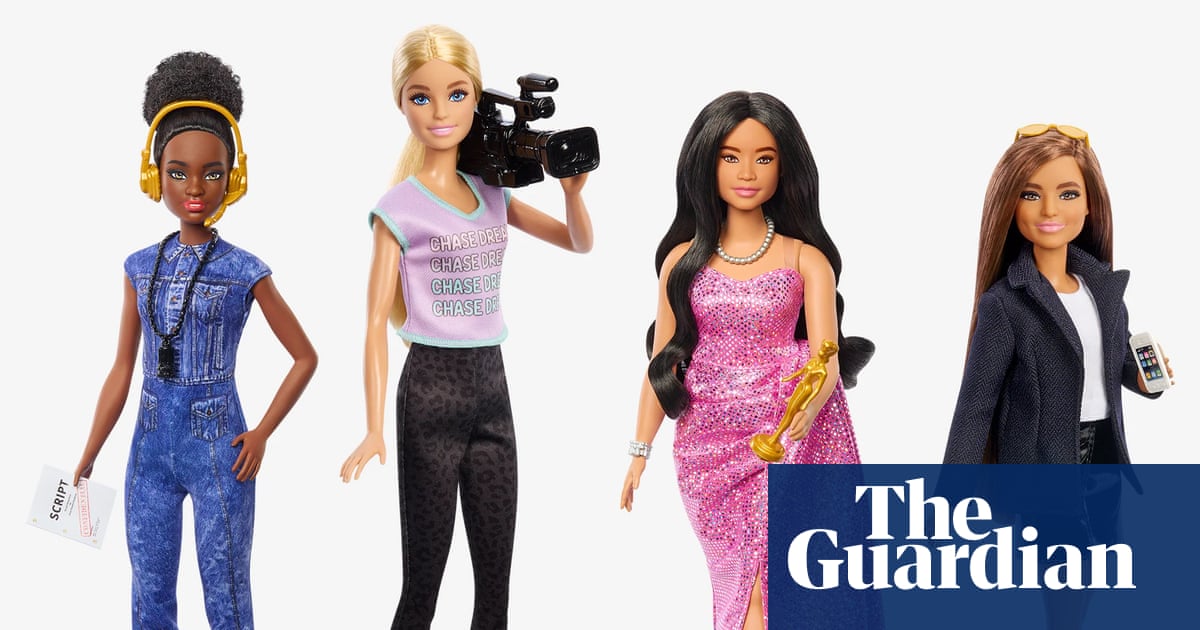
Three months after the end of the Writers Guild of America strike, screenwriters have spearheaded a backlash to a new range of Barbie dolls.
Mattel’s new “women in film” range, unveiled on Wednesday, includes a “studio executive Barbie”, a “film star Barbie”, a “director Barbie” and a “cinematographer Barbie”, but leaves the people responsible for scripts unrepresented.
“Where is Screenwriter Barbie?” posted Taffy Brodesser-Akner, author of Fleishman Is in Trouble and its screen adaptation, on X. “Does Mattel not know how to make sweatpants? Does Mattel not know how to get avocado toast on a t-shirt and just kind of leave it there?”
She added, “Filing Quarterly/WGA Dues Barbie would be hit among a certain crowd is what i’m saying,” before responding to another tweet questioning the sidelining of other crew roles by writing: “Key Grip Barbie found Lighting Department Head Barbie too handsy and filed a complaint with Line Producer Barbie, I just heard. First AD Barbie heard about it and said it wasn’t a big deal, it’s just how people joke around.”
The Wire creator David Simon wrote on X: “No writer Barbie. No grip Barbie. No Teamster Barbie. No key set PA Barbie who has to go into Movie Star Barbie’s trailer and tell the delicate flower to get the fuck down to set because 120 other pissed-off Barbie’s are waiting for her. That film taught Mattel nothing.”
Film critic Anna Smith was more positive about the range. “I think overall the range represents progress,” she told the Guardian. “How incredible for kids to have a female director toy to play with!”
Smith hosts the podcast Girls On Film and reports many of her guests saying they had discounted careers in cinema because of a lack of representation. “They didn’t grow up seeing or hearing about women in the industry, apart from actresses.
“Of course, it would be wonderful to see all sides of the industry represented, with dozens of Barbies, from grips to screenwriters to production designers. But overall I feel the range is a step in the right direction.”
The quartet of new dolls is part of Mattel’s annual “career of the year” drive, shining a light on a particular industry or profession. It comes in the wake of the success of Greta Gerwig’s hit film, Barbie, which was co-written by Gerwig with Noah Baumbach, and produced by its star, Margot Robbie.
The film, which took two Golden Globes last Sunday, was the highest-grossing movie of 2023, and the first movie directed by a woman to make more than $1bn.
It is among a number of films by female writer-directors featuring in this season’s awards conversation, which also features Emerald Fennell’s Saltburn, Celine Song’s Past Lives and Sofia Coppola’s Priscilla. Concert films from Taylor Swift and Beyoncé have also proved lucrative draws at the box office over recent months.
Two studies published last week found that advances in female representation behind the camera were sluggish, despite such success stories.
The USC’s Annenberg Inclusion Initiative’s latest report, titled Inclusion in the Director’s Chair, branded the entertainment industry’s pledges to promote inclusion “performative acts” and “not real steps towards fostering change”.
Meanwhile, a study by the Center for the Study of Women in Television and Film at San Diego State University found that women comprised just 16% of directors and 17% of writers on the 250 top-grossing films in 2023, down from 18% in 2022.
The total number of female crew on such movies, they calculated, represents a decline of two percentage points from 24% in 2022 and an increase of just five percentage points since 1998.
Yet on independent productions, the statistics were rosier: 42% of the writers of indie films were female, up from 40% the previous year and from 35% in 2021-22.
In the UK, while the overall total of female writers working in film is smaller, the percentage rise in their representation is faster than on US studio productions. In 2018, 60 British women had films released, compared with 23 in 2009.












